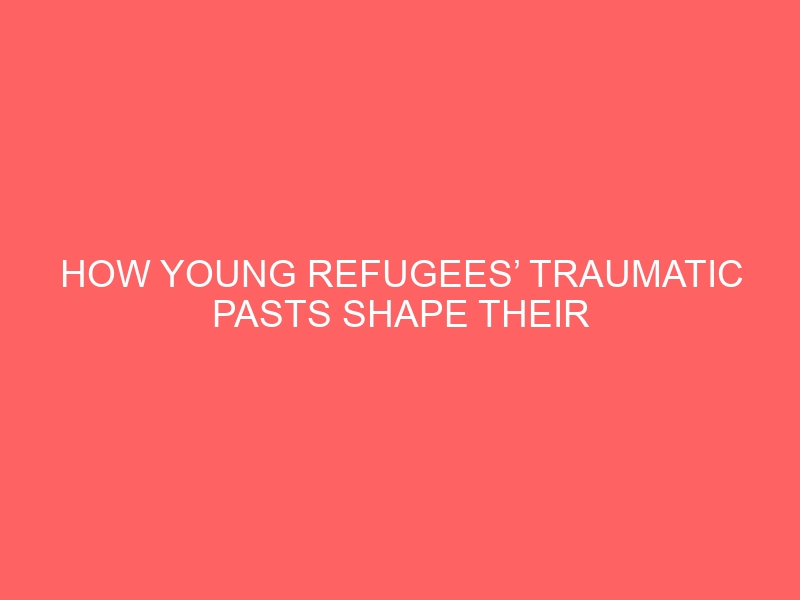Marteza Hasani fled Afghanistan in 2005 when he was six years old. During the war there, he found the beheaded body of his father, who had been killed by the Taliban, in front of his family home. That was the first of many unimaginable traumas he faced before arriving in Germany as a refugee in 2015. “I couldn’t get the image of my father out of my head,” he says.
Hasani is one of more than 100 refugees who have taken part in a study to examine how mental health can be damaged by such traumas — it is perhaps the largest and most detailed of young refugees’ psychological status carried out so far1. Young people who flee their countries are already at greater risk of developing mental-health problems than is the general population. Migration itself is known to be a factor in developing such disorders — but many refugees also experience violent and life-threatening events before and during their flight. The latest study is the first to try to quantify how these events affect psychiatric problems — and it finds that the risk of developing mental-health problems, and their severity, rises significantly with each accumulated trauma a person has experienced.
“The data are very impressive,” says psychiatrist Andreas Meyer-Lindenberg, director of the Central Institute of Mental Health in Mannheim, Germany. It’s expected that refugees who have experienced more trauma would be at higher risk of developing mental-health issues, he says. “But the extent is remarkable.”
The results reveal the need to change refugee policies, says Hannelore Ehrenreich, a neurologist and psychiatrist at the Max Planck Institute of Experimental Medicine in Göttingen, Germany, who led the study. For example, many countries — including Germany, where the work was conducted — forbid refugees from working or integrating into society until they have been granted asylum. “This waiting in fear of being sent back to the countries they fled piles on more stress — and so adds to their cumulative risk of mental-health problems,” she says.
Environmental stressors
Nearly 71 million people worldwide are seeking asylum globally, according to the United Nations. Since 2014, Germany — which took a large share of the people arriving in the European Union in the 2015 migrant crisis — has received nearly 2 million asylum seekers. Many live for years in refugee centres before learning whether they have been granted asylum.
Environmental stressors can increase the risk of young people developing psychiatric disorders, particularly if they already have a slight genetic predisposition. These range from experiencing or witnessing violence to migration and living in cities. In a 2014 study, Ehrenreich showed2 that even being the child of a migrant constitutes such a risk.
In the latest research, her team recruited 133 apparently healthy young migrants from 9 refugee centres in Germany in 2018–19. Eighty per cent were male, and nearly one-third were unaccompanied minors at the time of their flight. Many were from Afghanistan, Syria and Iraq.
Neurologist and psychiatrist Martin Begemann conducted detailed physical, psychological and cognitive examinations of each participant. He asked about their traumatic experiences, which often included torture, slavery and physical and sexual abuse. He found scars from gunshot wounds, stabbings, explosions, burns and electric shocks on 40% of the participants.
Begemann then conducted interviews to determine whether the participants showed signs of depression, psychosis or cognitive difficulties. He organized psychiatric treatment for those who needed it.
Risk correlation
The team counted the number of environmental risk factors to which each participant had been exposed in addition to migration. More than 40% had 3 or more extra risk factors — for example, having been raped or enslaved. Just 4.5% had no extra risk factors.
The researchers used their assessments to quantify a person’s overall risk of mental-health problems, and found that this rose stepwise with the number of risk factors experienced. In addition, refugees’ ability to cope with daily life declined with each additional trauma. The team also found some factors that had been thought to be ‘psychologically protective’, such as fleeing with a family member or a friend, didn’t seem to mitigate the effects of the negative stressors.
The authors note that stressors continue in host nations — for example, poor living conditions, multiple relocations, social exclusion and hostility towards refugees because they are foreigners. Stressful conditions such as these in many centres only add to the risk and the latest work emphasizes this, says Peter Ventevogel, senior mental-health officer at the UN Refugee Agency in Geneva, Switzerland.
The situation in Europe is particularly critical now, he adds. One-third of the roughly 39,000 refugees in camps in the Greek Aegean islands are under 18. “These children are stuck in limbo, feeling helpless — and this is very bad for mental health,” he says.
Hearing the young refugees’ stories of brutality took its toll on Begemann. “I had nightmares, and had to have psychiatric counselling and therapy for a while.”
For participants such as Hasani, the study was beneficial because it led him into psychiatric therapy. “Now I am feeling better and can sleep,” he says.

